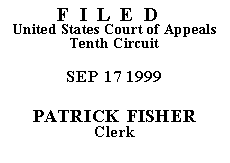

| ARNOLD L. TALBOTT,
Plaintiff-Appellant,
v.
SHEILA WIDNALL, Secretary,
Department of the United States Air
Force, Agency Defendant-Appellee. |
No. 98-1361
(D.C. No. 97-M-139) (Colorado) |
Mr. Arnold L. Talbott, plaintiff, brought a Title VII action against Dr. Sheila Widnall, Secretary, Department of the United States Air Force, pursuant to 42 U.S.C. §§ 2000e et seq., regarding the revocation of Mr. Talbott's security clearance and subsequent termination of employment. The district court dismissed the claim for lack of subject matter jurisdiction. We affirm.
This case has a tortured and confusing past which we review only in relevant part. Mr. Talbott was a civilian employee of the United States Air Force where he worked as an audio visual production specialist. In 1993, Mr. Talbott filed discrimination complaints with the EEOC. In April 1994, the Air Force suspended his security clearance which eventually led to his employment termination. As a result, Mr. Talbot modified his EEOC complaint to further allege his suspension was the result of the Air Force's retaliation against him for filing the earlier EEOC discrimination claims. The two parties negotiated a settlement under which Mr. Talbott's security clearance would be reinstated. The Air Force allegedly breached the settlement agreement when it refused to reinstate the clearance. On June 24, 1996, an EEOC administrative judge found in favor of Mr. Talbott on his claims of reprisal. The findings were adopted by the Appellate Review Division of the Air Force on September 9, 1996.
Mr. Talbott brought suit in federal district court under Title VII seeking to either have his security clearance reinstated or to receive damages for the suspension of his security clearance. The court dismissed the complaint under Fed.R.Civ.P. 12(b)(1) for lack of subject matter jurisdiction after concluding that Mr. Talbott's claims required court review of the revocation of his security clearance, which is well beyond the jurisdiction of a federal district court. Mr. Talbott appeals pro se.
We review de novo a dismissal for lack of subject matter jurisdiction. See Bryan v. Office of Personnel Management, 165 F.3d 1315, 1318 (10th Cir. 1999). It is well established that a district court has no jurisdiction to review the merits of a decision to revoke or deny a security clearance. See Hill v. Department of Air Force, 844 F.2d 1407, 1411 (10th Cir. 1998). In Hill the plaintiff challenged the revocation of his security clearance by the Air Force. Applying Department of the Navy v. Egan, 484 U.S. 518 (1988), we held that courts have no statutory authority to review "the merits and motives of Air Force decisions relating to Hill's clearance, and the nexus between those decisions and national security interests." Hill, 844 F.2d at 1411. Furthermore, we determined that since "no one has a 'right' to a security clearance," id. at 1409 (quoting Egan, 484 U.S. at 528), there is no liberty or property interest to protect, id. at 411. Accordingly, no Fifth Amendment due process right is implicated. See id.
In the instant case, Mr. Talbott asserts a number of issues. We only address those presented to the district court. See City of Stilwell v. Ozarks Rural Elect. Coop., 166 F.3d 1064, 1073 (10th Cir. 1999) (declining to consider an issue not raised below). The four issues raised below were discrimination and retaliation in violation of Title VII, a constitutional due process violation "in regard to the suspension and revocation of his security clearance, and loss of his job," rec. vol. I, doc. 59, at 14, and a breach of the negotiated settlement agreement for failure to reinstate his security clearance. Mr. Talbott argues that we can review these claims because they are separable from the merits of the revocation of the security clearance. We address the jurisdictional issue for each claim in turn.
Essentially, Mr. Talbott contends that the motives behind the revocation of the security clearance were discriminatory and retaliatory. As we stated in Hill, the motives for the denial of a security clearance are not reviewable by a court. See Hill, 844 F.2d at 1411. We thus have no jurisdiction over Mr. Talbott's claims of discrimination and retaliation.
Hill also directly controls Mr. Talbott's due process claim. Because we expressly stated in Hill there is no "right" to a security clearance and therefore no entitlement to due process, we also cannot review this issue.
Finally, the breach of the negotiated settlement turns entirely on the decision of the Air Force not to reinstate the security clearance. This claim is inextricable from a review of the merits of granting a security clearance, which again is not within the subject matter jurisdiction of the courts.
There is one remaining issue which we summarily address. Mr. Talbott argues that the magistrate erred in failing to consider his Motion for Default which he filed after defendants did not respond to several requests for admissions submitted to them in May 1997. A review of the record shows that Mr. Talbott failed to object to the magistrate's report on this basis. See rec., vol. I, doc. 79. He therefore waived his right to raise the issue on appeal. United States v. One Parcel of Real Property, 73 F.3d 1057, 1059 (10th Cir. 1996).
We AFFIRM the judgment of the district court.
ENTERED FOR THE COURT
Stephanie K. Seymour
Chief Judge
*.This order and judgment is not binding precedent, except under the doctrines of law of the case, res judicata, or collateral estoppel. The court generally disfavors the citation of orders and judgments; nevertheless, an order and judgment may be cited under the terms and conditions of 10th Cir. R. 36.3.